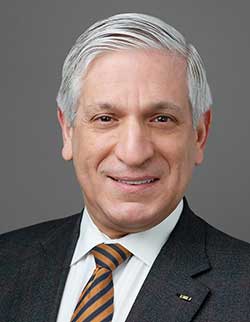Bilateral Hip Surgery Summary
I want to share a quick summary of my hip replacement experience at HSS as encouragement to others to have the surgery when they are ready. I went nearly 8 years with bone on bone arthritis on both sides and survived using foot orthotics to re-balance my gait and reduce pain. Previous docs told me to wait for the operation until I was crawling. Well, I wasn't crawling (walked 30 blocks one day, slowly and in pain, just before the operation), but I got to the point that I could not sleep at night even with 2 Aleve - and then I decided it was time.
HSS focuses on orthopedics, has 38 operating rooms (more than any other hospital), has a well-honed process of patient education, care, and follow-up, with orthopedic operation volumes that far exceed all other practices. The result is a state-of-the-art surgical practice, warm and professional care, and a brilliant outcome. Now that I know what I know, HSS is the go-to-institution of choice I will recommend to all others in the future.
I had bilateral (both at once) anterior (operated on from the front) total hip replacement (THR). My doctor was Michael M. Alexiades at Hospital for Special Surgery in NYC. I chose him because he has done 11,000 hips, 9,000 anterior procedures, and hundreds of bilaterals, easily beating in volume any other doctor I found (interviewed three from a long list); because he works in one of the best hospitals in the country, and because both were eligible under my health insurance plan. Dr. Alexiades cares enough despite the incredible pace of his practice to spend whatever time you need to understand the procedure and to answer patient concerns. Considering he is a global expert, his patient communication skills are humble and encouraging. Dr. Alexiades uses the anterior approach on patients that qualify (in relatively good physical condition/not too overweight). Anterior requires a small incision on the front of the hip, parting of muscle and tendons to operate vs. cutting of muscle, and results in such immediate response (see below) that today, it should be the only approach in my view. He used the Biomet THR product, because it now offers effective lifetime operation, and with Titanium socket/ceramic ball joint/high grade plastic cushioning it eliminates the past metal migration/inflammation problems people were having in past years that had generated hundreds of lawsuits. I had worried about that and avoided it for years, but those issues now have been resolved by new designs.
Event Timeline
• I met Dr. Alexiades in NY Jan. 11, liked him, found he had a slot open up 3 weeks later on Feb. 1, and decided to go for it
• The same day I stayed for 3 hours at the hospital and went through ½ of the pre-op steps (general medical exam, blood tests, EKG, x-ray, CT, anesthesiology interview, one hour of physical therapy review of pre-op and post-op exercises)
• Jan. 21, I returned to the hospital to finish the second half of the pre-op steps above. The same week I donated one pint of blood to myself (autonomously) in New Brunswick for the operation in case it was needed (two hips, greater risk of blood loss)
• Week of Jan. 21 I borrowed recommended medical assistance equipment from friends and from a local Church’s medical equipment ministry I borrowed: walker, four footed cane, standalone raised toilet (seat and bucket with 4 legs), 6” raised toilet seat insert with attached handles, and I bought a 2 foot long shoe horn
• Week before the operation I buttoned down the hatches on all my business activity and warned associates I would be out of commission a week plus
• Also week before I stopped all medicines, particularly pain meds that affect bleeding like aspirin and NSAIDS like Aleve. I learned that week how bad I really was as slept little all week due to pain
• 2 days before the operation I set up the bathroom gear; got some foam rubber for a raised seat to put on my couch for watching TV; set up a bed in my family room that was raised higher than usual and could be tilted up at the head (we put couch pillows under the mattress) so I could sleep (and snore) on my back and have easy access to the bathroom without sleeping upstairs and bothering my wife. I started a low fiber diet, and packed a small bag of loose long sleeved T shirts, sweatpants, underwear, socks, slip on shoes, and minimum toiletries. Also glasses, mobile phone, charger, credit card (to buy TV time at hospital) and (KEY!) eye mask (to block out hospital light at night) and good silicon earplugs (to block out incessant hospital noise)
• One day before the operation I went on a near all liquid diet to reduce bathroom urges the next day. That night I self-administered an enema using a kit they supply
• Day of surgery I had to be at the hospital at 7 AM. I chose to stay at home rather than going to a hotel in the city. I woke up very early, showered with a special antibiotic sponge they give you, put on comfortable clothes, took took trains to the city, and took a cab to HSS. No food.
• Monday Feb. 1, I registered, waited until they were ready, then they prepped me (shave your leg(s) at the top, more cleaning, put you in a hospital gown). Then surgery – one hour per hip, four inch incision, glued repair (no sutures, no staples, no bleeding or oozing (!)). Then about two hours in ICU recovery, then 10-12 hours in ICU step-down. Family can visit during this time only a couple periods a day, for just 15 minutes. Within 12 hours I was moved to a typical shared hospital room.
• In the first 2-3 days here is what to expect:
hip pain indeed gone, but in its place is high pain (managed by medications) in upper to mid outside thigh that feels like extreme stiffness/tearing (no worries – all related to gentle nerve damage during surgery as they slip materials around muscles and nerves to replace the hip. This new pain continues for the next 2 weeks, going down by day). 4 inch wound on either side, no sutures, just glued and held together with 10+ steristrips/side
drugged/out of it feeling and no appetite all the time – I took Percocet, eventually had to switch to tramadol as I was way woozy. Started at the equivalent of 4 tramadol every 6 hours. This was too much, cut it in half.
with a walker and guidance you will be up and on your own in the bathroom within hours of catheter removal (within a day or so). With the saline keeping you hydrated, the drug effect, and swelling you will be peeing every 2 hours for days
by the second day you will be walking (slowly, woozy, with walker, down the hall, and later that day on test stairs with a cane). Otherwise rest, regular food, some TV
by the third day you will be (still slowly) walking further with the walker and better on the stairs. still tired, still pretty painful other than laying still on your back
once you can walk down the hall with strength and do the stairs well – you go home.
• With bilateral hip I went home day 3 (Thursday) midday somewhat weak, still a bit woozy/tired, low appetite
• Friday the 5th I slowly shuffled around a bit with the walker and went up and down our (13) stairs OK, took a shower on my own, dressed myself (slow with the socks), slept a lot, had a burger, did some work on the computer, did some exercises. A lot of leg swelling. OK sleeping on back, taking 1 tramadol every 6 hours, Tylenol for headaches (dehydrated), and coumadin pills to avoid clots (5 weeks). Less woozy. In and out of bed and chair very slow to avoid tearing pain (all caused by nerve damage to muscles and stiffness, NOT due to hip or wound pain). Weird. Also second bowel movement to back to normal
• Saturday I woke up alert and started to feel better. Took cane and went on three errands in the car, including lunch at a local deli. Then took 3 hour nap – still recovering. So much for being ready to go
• Sunday (less than a week from Surgery) I stopped using all the equipment (no more walker or cane, in less than a week from surgery). I lurched around the house hurting but stable, and started doing catch-up work on the computer. During the first 2 days at home I did use the elevated seat toilet, but stopped needing it after day 6, and never used the 4 legged over-the-toilet model. I also used the long handled shoe-horn for about 2 weeks.
• Monday and Tuesday I worked on the computer, stayed in, did exercises, saw two visiting nurses for blood work and PT, appetite back to normal, swelling going down
• Wednesday (day 9) I walked unaided 3 blocks, at half normal speed, with little pain. Later that day leg muscles hurt quite a bit – 3 blocks stressed them a bit – but OK
• Thursday I drove to my local town alone and did 3 errands. Slow walking, not much pain
• Friday and Saturday – even less pain, walking at ¾ speed. Still couldn’t pick up stuff on the ground without feeling it, still on pain meds 4X per day, but swelling way down, pain far less, strength returning, flexibility returning – and still before 2 weeks are up. I considered all this awesome.
• And remember, this was for 2 hips – one would be less trauma and less recovery time
• Saturday I felt just nothing in the hips, as though I was 20 years ago when you just assume good health, and only pain is nerve/muscular in the legs from the surgical stimulation, and from walking correctly upright on muscles that are not used to that so sore. Steristrips coming off. Went to dinner with friends..
• Sunday – Valentine’s – slept in my own bed. Was sore due to flat bed and muscles being stretched. Did not sleep well. Moved to family room bed at 7. Slept until 1:30 PM for lunch, then napped again for 3 hours. SO – still healing, needed the rest, but OK! Went to Val Day Dinner in Princeton!
• Walked 2 miles at 2 weeks, three miles at three weeks, and 5 miles at 4.5 weeks with no pain, and biked several miles at 5.5 weeks.
As I finish this I am 7 weeks post surgery. I have excellent balance, zero pain, mild numbness around the general hip area, and some stiffness that goes away quickly after sitting for awhile. I am told the waist stiffness will ease up at the 3-4 month milestone. I am going to physical therapy 3 days a week for 2 hours in the AM doing stretching and easy strengthening exercises. I am walking as much as possible, and have felt strength beginning to return to long atrophied muscles. But for daily walking/activity no one would know I had dual hip replacement. The recovery cycle is clearly very quick with anterior, and is totally manageable by anyone. If you have had years of pain, and you are limiting your life because of it, get the surgery done. It's a no brainer.





